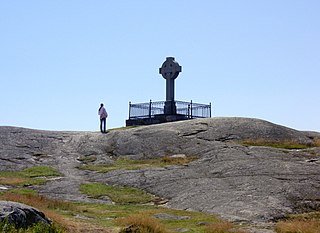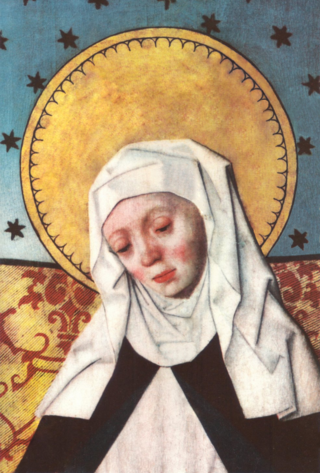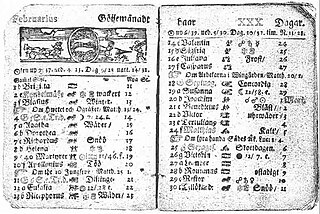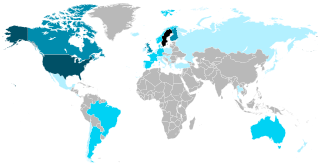
Birka, on the island of Björkö in present-day Sweden, was an important Viking Age trading center which handled goods from Scandinavia as well as many parts of the European continent and the Orient. Björkö is located in Lake Mälaren, 30 kilometers west of contemporary Stockholm, in the municipality of Ekerö.

In Christian belief, a saint is a person who is recognized as having an exceptional degree of holiness, likeness, or closeness to God. However, the use of the term saint depends on the context and denomination. In Catholic, Eastern Orthodox, Anglican, Oriental Orthodox, and Lutheran doctrine, all of their faithful deceased in Heaven are considered to be saints, but some are considered worthy of greater honor or emulation. Official ecclesiastical recognition, and consequently a public cult of veneration, is conferred on some denominational saints through the process of canonization in the Catholic Church or glorification in the Eastern Orthodox Church after their approval.

The Church of Sweden is an Evangelical Lutheran national church in Sweden. A former state church, headquartered in Uppsala, with around 5.4 million members at year end 2023, it is the largest Christian denomination in Sweden, the largest Lutheran denomination in Europe and the third-largest in the world, after the Ethiopian Evangelical Church Mekane Yesus and the Evangelical Lutheran Church in Tanzania.

Bridget of Sweden, OSsS, born Birgitta Birgersdotter and also known as Birgitta of Vadstena, was a Swedish Catholic mystic and the founder of the Bridgettines. Outside of Sweden, she was also known as the Princess of Nericia and was the mother of Catherine of Vadstena.

Öckerö Municipality is a municipality in Västra Götaland County in western Sweden. Its seat is located in the town of Öckerö on the main island, which is also called Öckerö.
Swedish pre-history ends around 800 AD, when the Viking Age begins and written sources are available. The Viking Age lasted until the mid-11th century. Scandinavia was formally Christianized by 1100 AD. The period 1050 to 1350—when the Black Death struck Europe—is considered the Older Middle Ages. The Kalmar Union between the Scandinavian countries was established in 1397 and lasted until King Gustav Vasa ended it upon seizing power during the Swedish War of Liberation, which concluded in 1523. The period from 1350 to 1523 is considered the Younger Middle Ages. During these centuries, Sweden gradually consolidated as a single nation.

Walpurgis Night, an abbreviation of Saint Walpurgis Night, also known as Saint Walpurga's Eve and Walpurgisnacht, is the eve of the Christian feast day of Saint Walpurga, an 8th-century abbess in Francia, and is celebrated on the night of 30 April and the day of 1 May. This feast commemorates the canonization of Saint Walpurga and the movement of her relics to Eichstätt, both of which occurred on 1 May 870.

Midsummer is a celebration of the season of summer, taking place on or near the date of the summer solstice in the Northern Hemisphere; the longest day of the year. The name "midsummer" mainly refers to summer solstice festivals of European origin, especially those in the Nordic countries. In these cultures it is traditionally regarded as the middle of summer, with the season beginning on May Day. Although the summer solstice falls on 20, 21 or 22 June in the Northern Hemisphere, it was traditionally reckoned to fall on 23–24 June in much of Europe. In Christian tradition, these dates coincide with Saint John's Eve and Saint John's Day. It is usually celebrated with outdoor gatherings that include bonfires and feasting.

The French West Indies or French Antilles are the parts of France located in the Antilles islands of the Caribbean:

John Robinson was an English diplomat and prelate. He became the Bishop of London and Dean of Windsor, succeeding to Henry Compton.

The Swedish slave trade mainly occurred in the early history of Sweden when the trade of thralls was one of the pillars of the Norse economy. During the raids, the Vikings often captured and enslaved militarily weaker peoples they encountered, but took the most slaves in raids of the British Isles, and Slavs in Eastern Europe. This slave trade lasted from the 8th through the 11th centuries. Slavery itself was abolished in Sweden in 1335. A smaller trade of African slaves happened during the 17th and 18th centuries, around the time Swedish overseas colonies were established in North America and in Africa. Similarly to other European powers, slavery was banned in the motherland while being legal in the colonies. Consequently, slavery remained legal on the sole Swedish Caribbean colony of Saint Barthélemy from 1784 until 1847.

In Christianity, a name day is a tradition in many countries of Europe and the Americas, among other parts of Christendom. It consists of celebrating a day of the year that is associated with one's baptismal name, which is normatively that of a biblical character or other saint. Where they are popular, individuals celebrate both their name day and their birthday in a given year.

Swedish overseas colonies consisted of the overseas colonies controlled by Sweden. Sweden possessed overseas colonies from 1638 to 1663, in 1733 and from 1784 to 1878. Sweden possessed five colonies, four of which were short lived. The colonies spanned three continents: Africa, Asia and North America.
The Lutheran liturgical calendar is a listing which details the primary annual festivals and events that are celebrated liturgically by various Lutheran churches. The calendars of the Evangelical Lutheran Church in America (ELCA) and the Evangelical Lutheran Church in Canada (ELCIC) are from the 1978 Lutheran Book of Worship and the calendar of the Lutheran Church–Missouri Synod (LCMS) and the Lutheran Church–Canada (LCC) use the Lutheran Book of Worship and the 1982 Lutheran Worship. Elements unique to the ELCA have been updated from the Lutheran Book of Worship to reflect changes resulting from the publication of Evangelical Lutheran Worship in 2006. The elements of the calendar unique to the LCMS have also been updated from Lutheran Worship and the Lutheran Book of Worship to reflect the 2006 publication of the Lutheran Service Book.
In Finland, a person must have a surname and at least one given name with up to four given names permitted. Surnames are inherited either patrilineally or matrilineally, while given names are usually chosen by a person's parents. Finnish names come from a variety of dissimilar traditions that were consolidated only in the early 20th century. The first national act on names came into force in 1921, and it made surnames mandatory. Between 1930 and 1985, the Western Finnish tradition whereby a married woman took her husband's surname was mandatory. Previously in Eastern Finland, this was not necessarily the case. On 1 January 2019, the reformed Act on Forenames and Surnames came into force.

A birthday is the anniversary of the birth of a person, or figuratively of an institution. Birthdays of people are celebrated in numerous cultures, often with birthday gifts, birthday cards, a birthday party, or a rite of passage.
In Sweden, public holidays are established by acts of Parliament. The official holidays can be divided into Christian and non-Christian holidays. The Christian holidays are jul (Christmas), trettondedag jul (Epiphany), påsk (Easter), Kristi himmelsfärds dag, pingstdagen (Pentecost), and alla helgons dag. The non-Christian holidays are: nyårsdagen, första maj, Sveriges nationaldag, and midsommar (Midsummer). Midsummer is, however, officially also a Christian holiday to celebrate John the Baptist's birthday.

Swedes, or Swedish people, are an ethnic group native to Sweden, who share a common ancestry, culture, history and language. They mostly inhabit Sweden and the other Nordic countries, in particular Finland where they are an officially recognized minority,[d] with Swedish being one of the official languages of the country, and with a substantial diaspora in other countries, especially the United States.















